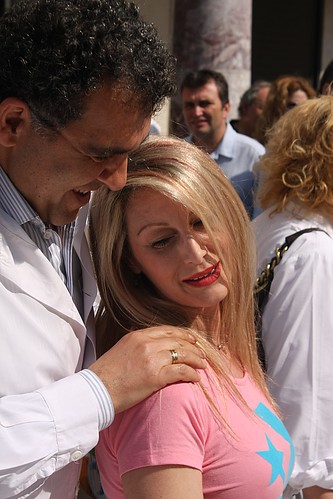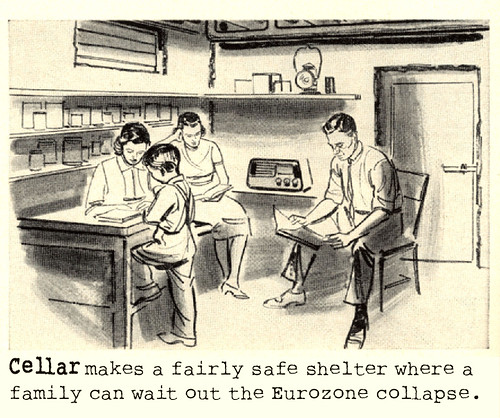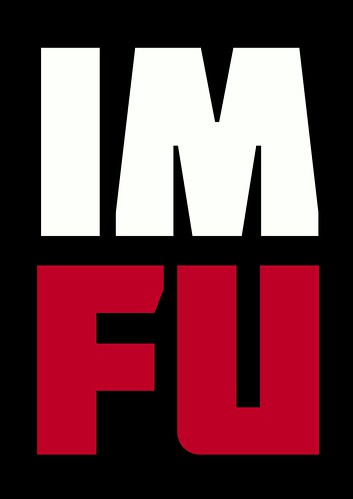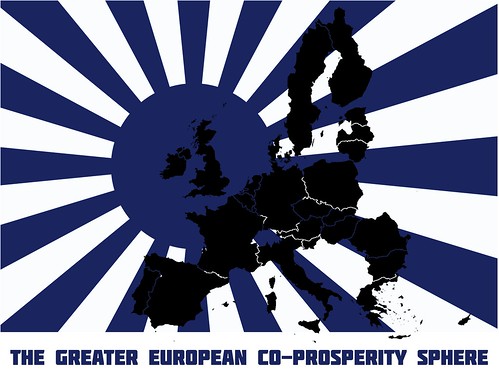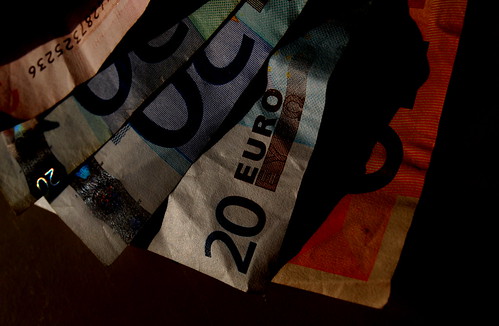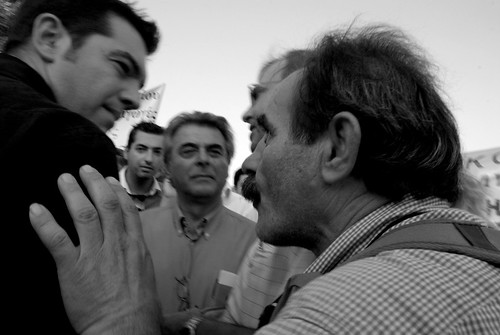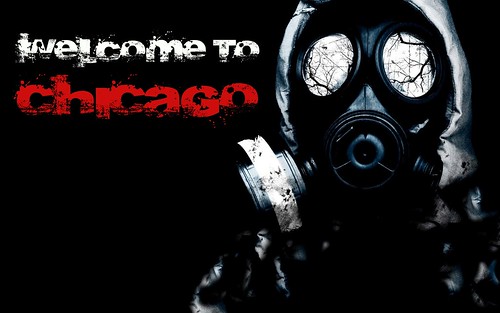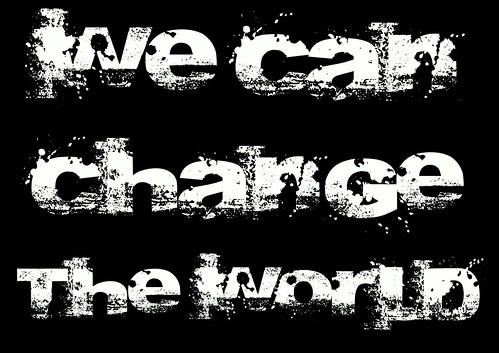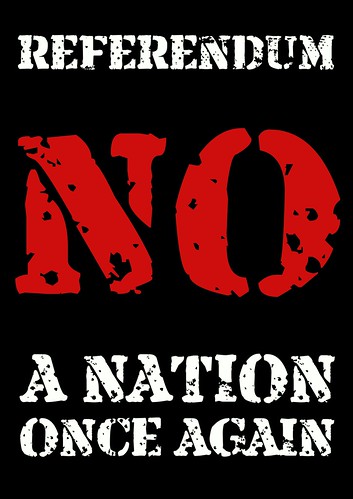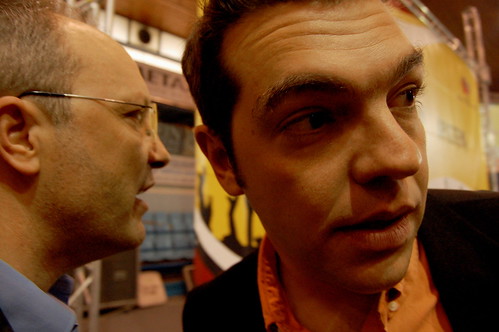Thursday, May 31, 2012
VOTE YES - Irish referendum
Today Ireland goes to the polls to accept or reject the Fiscal Treaty. A YES vote will mean Greek style austerity measures will be implemented by Dublin.
Wednesday, May 30, 2012
Austerity in Greece - If you tolerate this, then your kids will be next.

Austerity in Greece - If you tolerate this, then your kids will be next., a photo by Teacher Dude's BBQ on Flickr.
This picture was taken in the centre of Thessaloniki, Greece's second largest city. The young teen, no older than 13 or 14 was wheeling a shopping trolley full of scrap metal just metres away from the high end hotels and shopping malls that call this part of the town home.
He, along with many even younger can be seen in the city rooting through the recycling bins for cans, scrap metal and paper.. For those who scavenge, beg, sell trinkets and wander the streets of this European city there is no school or perhaps even a future, except for more of the same.
Tariq Ali speaking in Greece
Ali addressing an audience at the Aristotelion university of Thessaloniki, Greece. Video of his speech here in English, with Greek translation.
Tuesday, May 29, 2012
Lies, damned lies and Greek opinion polls

Yesterday the world's financial markets rose like a helium balloon on the news that weekend opinion polls in Greece showed that the conservative, pro-memorandum party, New Democracy was ahead. Even the Athens Stock Exchange got a respite from a nosedive that has seen its index fall to figures last seen in the 1990s.
There are many possible explanations for New Democracy's reversal of fortunes. Antonis Samaras has been building a conservative coalition and perhaps many voters who would have voted for smaller right wing parties are now transferring their votes to him as the only viable centre right alternative to SYRIZA.
On the other hand the constant barrage of predictions on TV about possible exit from the Eurozone has frightened older voters who fear their life savings will evaporate should the drachma be reintroduced and so perhaps signals a swing back to more mainstream politics.
Yet, according to an insightful analysis there may be another more concrete reason for the sudden challenge to the popularity of Radical Left Coalition (SYRIZA). In the opinion of Greek blogger, Alepouda there is a systematic bias in polls conducted in Greece with the upshot that means that estimates of SYRIZA's share of the vote are wildly off. The most inaccurate being a GPO poll carried out for the current affairs programme, Anatropes on MEGA TV on the 25th April, just weeks before the 6th May elections. According to the poll SYRIZA was predicted to get 6.2% whilst the final election result was 16.78%. Strangely, the results for both PASOK and New Democracy were less than 2% off.
Nor is this anomaly limited to GPO, other pollsters have revealed similar deviations in their estimates of SYRIZA's electoral strength. Indeed, according to Alepouda's infographics the average result opinion poll researchers claimed for SYRIZA was 9.1%, more than 7 percentage points lower than their final figure. In the case of all other political parties the difference was less than 1%.
How to explain such amazing accuracy in the case of every other party apart from SYRIZA? Statistically, there seems to be no logical explanation for such a large error. On the other hand, more sceptically minded commentators might be left with the impression that the media war being waged upon Greek parties opposed to austerity measures is not limited to the mainstream press but has extended to those companies that rely on such media outlets for their very survival.
Monday, May 28, 2012
Whoops!! There goes the Eurozone
Sunday, May 27, 2012
2012 - SYRIZA is to blame. ΦΤΑΙΕΙ Ο ΣΥΡΙΖΑ
Forget Mayan predictions for the end of the world, according to much of the Greek mainstream press, the rise of the Radical Left Coalition (or SYRIZA as it is known in Greek) presages the end of western civilisation as we know it.
To listen to some accounts you would think that the country hasn't been in such dire peril since the Visigoths came rampaging down the Balkan peninsula in 378AD.
Foreign reporting has hardly been much better with dire warning that Athens, Europe and in some case even the entire world economy teeters on the brink of collapse, brought there by the possibility of SYRIZA gaining power and keeping their campaign pledge to re-negotiate the terms of the country's bailout pact.
In such an atmosphere of hyperbole and exaggeration the phrase "Ftaiei, o SYRIZA" (SYRIZA is to blame) has become something of a insider's joke for Greek commentators on the internet.
However, behind the humour lies the fact that Greek voters have been subjected to a long and often dirty media campaign to scare them into voting for parties who have promised to abide by the terms set down by the EU and IMF. It is hoped that such fear mongering will bring them back into the fold and reduce support for parties opposed to yet more austerity.
To a certain extent is seems to be working as the conservative New Democracy party has risen in the polls, but also so has SYRIZA, whose dogged determination not to bow to international pressure has won it support from those disgusted with the endless machinations of more mainstream parties.
For those who do not speak Greek, the parody video above shows a wife finding her husband in bed with her best friend. The husband, taken by surprise comes up with a series of lame explanations before hitting upon one that works, "SYRIZA is to blame". She slaps him across the face before accepting his apology.
To listen to some accounts you would think that the country hasn't been in such dire peril since the Visigoths came rampaging down the Balkan peninsula in 378AD.
Foreign reporting has hardly been much better with dire warning that Athens, Europe and in some case even the entire world economy teeters on the brink of collapse, brought there by the possibility of SYRIZA gaining power and keeping their campaign pledge to re-negotiate the terms of the country's bailout pact.
In such an atmosphere of hyperbole and exaggeration the phrase "Ftaiei, o SYRIZA" (SYRIZA is to blame) has become something of a insider's joke for Greek commentators on the internet.
However, behind the humour lies the fact that Greek voters have been subjected to a long and often dirty media campaign to scare them into voting for parties who have promised to abide by the terms set down by the EU and IMF. It is hoped that such fear mongering will bring them back into the fold and reduce support for parties opposed to yet more austerity.
To a certain extent is seems to be working as the conservative New Democracy party has risen in the polls, but also so has SYRIZA, whose dogged determination not to bow to international pressure has won it support from those disgusted with the endless machinations of more mainstream parties.
For those who do not speak Greek, the parody video above shows a wife finding her husband in bed with her best friend. The husband, taken by surprise comes up with a series of lame explanations before hitting upon one that works, "SYRIZA is to blame". She slaps him across the face before accepting his apology.
Saturday, May 26, 2012
Thursday, May 24, 2012
Wednesday, May 23, 2012
Monday, May 21, 2012
"A hideous ecstasy of fear" - The media and the Greek crisis.
The best things in life are free, a photo by Teacher Dude's BBQ on Flickr.
The possibility of Greece leaving/being forced out of the Eurozone has been dominating the local news cycle for days. Ever since Athens failed to form a government last week, the press has been full of stories of what might happen if Greece once more returned to the Drachma. 'The Gates of Hell will open', 'Greece will live scenes straight out of the Apocalypse'' are two examples of the kind of fear tactics being used by politicians and reporters.
Internationally, the quality of debate is not much higher, nor more informed. Instead, normally sober news agencies pump out the kinds of headlines usually associated with the possibility of Godzilla stomping down town Tokyo. However, behind the hysteria and hyperbole there is also lot of very poor journalism going on with facts taking a back seat to sensationalist "scoops". Whether this is just editors demanding juicier headlines or something darker is going on is a matter of debate.
(For the sake of full disclosure, I don't not live in a aluminium foil lined room for fear of the NSA trying to brain wash me with microwave signals broadcast from Area 51 LOL).
The most commonly misreported story is that Greeks see next elections as either a pro or anti Eurozone vote. This is simply not true as the vast majority of those asked in polls have reported that they want the country to retain the euro, a reminder that the historical fear of hyperinflation is not limited to the German psyche. Nor do any of the parties (with the exception of Greek Communist Party) advocate exit from the Euro as part of its election platform.
To give a taste of just how wide of the mark some of reporting concerning Greece is I've chose this article which appeared on the Reuters site today. It is not the only one of its type and compared with the abysmal domestic examples of panic journalism, not the worse. However, it is riddled through with factual errors, and unsubstantiated conjecture masquerading as in-depth analysis.
Ah, those boring olδ facts are such a drag in the fast moving 24/7 news cycle. Well, first of all there is no Global Strategy think tank, based in Thessaloniki. There is, however, a right leaning organisation called Strategic Initiative headed by Marios Efthymiopoulos and his brother, coincidence perhaps?
Also the idea that Greece has no printing press is also mistaken, As well as the defunct printing press now housed in the museum in Athens, the Bank of Greece also has facilities to print notes and mint coins. The Banknote Printing Works of the Bank of Greece (IETA) is based in Holargos, which is the Halandri district, Attiki.
The author, Peter Apps also says that "Already this week, Greek savers - and smaller numbers elsewhere in the southern euro zone - have begun to take money from banks" Well, people often take their money out of banks, even when there isn't a crisis and without an idea of the scale of withdraws (Link? Source?) this is just so much speculation. Perhaps Reuters is helping recycle the rumour that Greek banks were being deluged by customers taking out their savings and so had imposed a limit of 50E at ATMs. The good thing about a bank run is that just suggesting the possibility of one can make it real. That way analysts can ensure the accuracy of their own predictions.
Later on the article raises the idea of borders being closed and tanks on the streets. No self respecting scare story about Greece these days is complete without at least one reference to either civil war or military coup. (Strange how none of this is ever mentioned in discussions about Spain or Portugal which also suffered both).
The idea is that with a collapsing economy people would stuff their life savings and smuggle them out over the mountains to the north or across the Adriatic, so prompting Athens to close the country's borders. In which case, Greeks would not as they have done so often in the past, either hide money somewhere closer to home or covert it into a more easily concealable form? Rather they would lug suitcases full of cash around the country?
"Troops in the streets" Once again the idea is put forward that the army would be used to bring order to the streets? Who would give such an order if there is no government apart from an unelected caretaker one? And would the army obey? Gone are the days of the Cold War and the possibility that Greece could become a part of the Eastern Bloc. Given that the paranoia and tensions that helped fuel the 1967 military take over no longer exist, could conscript military units be persuaded to take on their own people in defence of a government that lacks popular support? Undoubtedly , there would be some Greek politicians who'd quite happily give the order but whether they would be listened to is unlikely.
As I mentioned before the article is a mish mash of ham-fisted speculation, deliberate exaggeration and sloppy reporting. unfortunately, as the Greek elections approach we are likely to see much more of its ilk as the stakes concerning the future of the Eurozone get higher and the gloves really come off.
Saturday, May 19, 2012
With new elections approaching EU's war of words with Greece gets down and dirty
The
announcement last week that none of the parties in the Greek
government were able to form a government has brought with it a dose
of madness that dwarfs even the fervid election campaign rhetoric
that proceeded it. If you were to take the statements of much of theforeign and local mainstream media at face value Greece is about to collapse andthat it will take with it much of the Eurozone.. Once again
Athens is at the centre of a maelstrom of media speculation that can
be seen as a retread of 2011 when the Greek prime minister, GiorgiosPapandreou raised the possibility of Greece holding a referendum on
whether it should implement yet more austerity measures . Then the suggestion was met by a
vociferous campaign from within Greece, not to mention the pressure exerted by Paris,Brussels and Berlin.
With
Papandreou now gone from the political scene, his role as the
Eurozone's enemy number one has been taken over by Alexis, Tsipras,
the leader of the Radical Left Coalition (SYRIZA), which if the name didn't
give you a clue is a group of socialist and communist parties who
shot into second place in the May elections campaigning on the
promise to defy European Union's demands for yet more austerity
measures.
The
results has been a surge of interest in Greece and a concerted
attempt to paint anti-austerity politicians and parties as extremist and dangerous. The new media narrative being created goes like this; Tsipras and, by extension any political group opposed to the terms set
down by Athens's creditors are putting in danger Greece's place in
the Eurozone and so inviting economic collapse by forcing it to
re-adopt the drachma. Some variations on this theme even go as far as
to say that Greece may even by kicked out of the EU, and so face
decades of North Korean style isolation.


It is a
story that has been carefully cultivated in the local press as well,
with daily horror stories coming out in the state run TV stations and
their allies in the privately controlled media sector. Pro-austerity
parties such as PASOK and New Democracy appear regularly to crank up
the fear factor by painting the Radical Left as a bunch of crazed
fanatics hell bent on destroying what's left of the economy.
If that
wasn't enough this week's non-story about a run on Greek banks was
gleefully jumped upon and news organisations were desperately trying
to recruit local bloggers/twitter users to feed them stories of
people besieging banks to take out their money. Rumours of banks
limiting withdraws to just 50 E swirled around the internet. That
neither was happening proved to be no impediment to reporters eager
to get another scoop.
The fact
that this week the EU decided to cut off funding to Greek banks it
deemed non-viable did nothing to help the situation , leading some
commentators to say that maybe that was their intention after all. An
example of yet more attempts to nudge the Greek electorate in the
“right”direction.
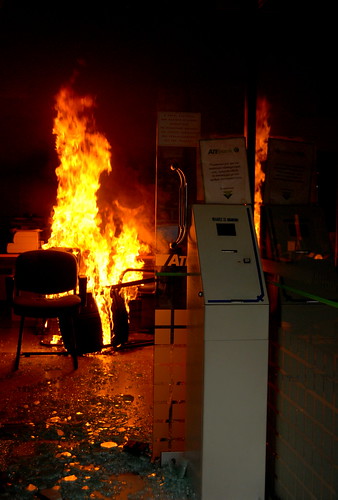

This week
also saw the arrival of EU president, Martin Schulz in Athens,
obstensibly to persuade the new Greek government to adhere to its
earlier fiscal commitments, however, his public appearances with both
the leaders of PASOK and New Democracy made it quite clear that the
EU wanted it's say in Greece's next round of elections. A message
with he then went to repeat on state run and pro-austerity channels
yesterday and today.
If that
wasn't enough the suggestion by German chancellor Angela Merkel toGreek president KarolosPpapoulias that Greece hold a referendum on
membership of the euro was meets by angry accusations of interference
in Greek internal affairs. Raising ugly memories of the two countries
troubled past relationship.
Ironically,
the suggestion, which the German chancellor's office denied (the
office of the Greek president then went on to deny the denial) has
helped undermine the position of those parties who are hoping to
persuade Greek voters to swallow more job cuts and tax increases
scheduled for June.


Whether
the fear of expulsion from the Eurozone is working is hard to tell.
Some local opinion polls have put New democracy ahead of SYRIZA but
then there are otherσ which show wildly differing results. The problem
is that no one knows what will happen in June. Gauging public opinion
has become much harder when the two main political parties are
constantly changing their make up and positions. PASOK has decided,
under it determinedly uncharismatical leader, Evangelos Venizelos to
distance itself from both scandal ridden past by abolishing much of
its present hierarchy.
On the
other hand Greece's right has seen a flurry of deals and team
changes. With members of the smaller unsuccessful parties jumping
ship to sign up with Samaras's right rainbow alliance. Howe much of
this will change the results of the elections is hard to say. Many of
those retuning to New Democracy such as ex party super star, Dora
Bakoyianni, northern populist, Panayiotis Psomiadis (once again the subject of legal proceedings) and
former MPs with the far right LAOS party are hardly the stuff that
electoral landslides are made of.
With a
party made up of those willing to change political allegiances at the
drop of a hat, it is going to difficult to persuade sceptical voters
that the right won't result to yet more u-turns and back flips if
elected.


Far away
from the endless media attention to those in mainstream politics,
ordinary Greeks continue to face the everyday grind of surviving in a
shrinking economy in which 30-40% are living in poverty, more than
half the country's youth (some of the most educated in Europe) are
without work and no one knows when things will get better.
Beyond
vague promises to renegotiate the terms of Greece's bailout, only
SYRIZA has offered something positive to those who have already lost
so much. Even if it's the empty gesture of defiance it gives
something concrete to those left bitter and disillusioned by the
country's more moderate political choices.
Labels:
. Greece,
Alexis Tsipras,
angela merkel,
antonis samaras,
brussels,
eu,
eurozone,
Evangelios Venizelos,
ez,
germany,
giorgos papandreou,
greek elections 2012,
New Democracy,
pasok evangelos venizelos,
SYRIZA
Friday, May 18, 2012
The National Bank of Greece adopts new slogan, "A furore Normannorumlibera nos, Domine".

The National Bank of Greece adopts new slogan, "A furore Normannorum libera nos, Domine"., a photo by Teacher Dude's BBQ on Flickr.
"From the fury of the Northmen release us, O Lord!", attributed to monks of the English monasteries plundered by Viking raids in the 8th and 9th centuries.
en.wikipedia.org/wiki/Norseman
Thursday, May 17, 2012
Tuesday, May 15, 2012
Monday, May 14, 2012
Greece's political elite gears up for new elections
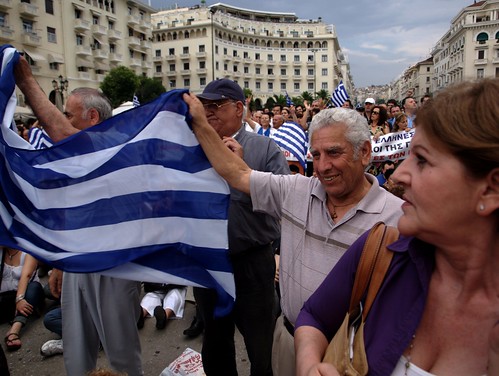
Greek composer, Mikis Theodorakis defies speaking ban to address anti-government rally, a photo by Teacher Dude's BBQ on Flickr.
Judging by the reports circulating in both the Greek and foreign media The End of Days is indeed almost upon us if Athens cannot form a government within the next 24 hours. You would think that such an awful prospect would focus minds of those in power and yet it is just business as usual for Greece's political elite who, even now are more interested in playing political musical chairs than in dealing with deep rooted problems.
According to much of the local media Greece is facing catastrophe as the Radical Left Coalition party (SYRIZA) is refusing to take part in a government of national salvation along with PASOK, New Democracy and the Democratic Left. As a result journalists and senior officials say that new elections will have to be held which could irreparably damage the country and lead to Athens exit for the Eurozone and possibly EU.
However, the maths do not add up. PASOK, New Democracy and Democratic Left have between them 168 seats in the country's 300 seat parliament, more than enough to form a majority government. Indeed, if the Independent Greek party could be persuaded to come on board then the coalition would boast an impressive 201 majority. However the fly in the ointment is the Democratic Left's insistence that they will only help form a government if SYRIZA is also part of it. On the right Panos Kammenos's conservative Independent Greeks have repeatedly refused to co-operate with New Democracy.

However, that is not the media narrative being promoted. Instead Antonis Samaras, leader of New Democracy, Evangelos Venizelos, leader of PASOK and Fotis Kouvellis, leader of Democratic Left have all put the blame firmly on SYRIZA's Alexis Tsipras. But if the situation is so dire then some kind of compromise can be reached, surely?
And the answer is no as this is all part of the tawdry political game that has been played since Greece sought help with its debts in 2009. Once again the heads of the two major parties are hoping to shore up their dwindling electoral base by scaring the living daylights out of voters with talk of unpaid pensions and imminent economic collapse. PASOK, led first by Giorgos Papandreou and then by Venizelos used the same language to push through austerity legislation despite the presence of hundreds of thousands of disgruntled Greeks protesters outside parliament.
Instead of cobbling together a government both Samaras and Venizelos are already campaigning for the next round of elections, most probably set for 17th June by attacking SYRIZA who are according to latest polls on track to be the largest party. The message is clear, if you vote SYRIZA Greece will go bankrupt, be kicked out of the Eurozone and all your savings will be lost. The EU has helpfully made such scenarios more realistic by refusing to release money promised for the payment of Greece's day to day running costs (money destined for debt repayments was paid on time).
It is a message that is likely to weigh on people's minds as they vote and may be enough to put off those considering voting left. On the other hand, unemployment, especially among the young is climbing rapidly, prices of basic goods are spiralling upwards and many have lost any hope of a decent future. Will they be swayed by talk of the End of Days? For them they are already here. Will talk of lost savings affect those under 30 who have none to speak of?
There are two contradictory forces at work as far as the next elections are concerned. On the one hand the fear of possible national bankruptcy may well drive those who still have something to lose back into the arms of New Democracy and PASOK and so give them a boost, perhaps enough to form a government of their own.
On the other hand disgust with the ineptitude and corruption of the current political set up has not disappeared and the inability of the main leaders to recognise that is costing them dearly. People know full well, that despite promises to renegotiate terms of the bailout agreement if Germany refuses (and there seems every indication that they will) then Greek politicians will have little choice but to accept the decision. Another round of public spending cuts and tax hikes would follow just adding to the economic woes that Greece has been facing for the last five years.

SYRIZA benefited from the disgust that ordinary Greeks feel about their government in May and that is likely to be repeated in June. However, there are several factors that may up their share of the vote still further. Both PASOK and New Democracy have shown that even after the drubbing they received they have not changed attitudes in the slightest and still continue to act as if the elections never happened. This will provide SYRIZA with extra votes, especially from younger voters who are not benefiting from the status quo.
Also the endless back room political games played by newly formed Democratic Left in the last few weeks have alienated even its own MPs and will cost them in June, the most likely recipient of their votes will be SYRIZA. The fact that the Greek Communist party has decided not to work with any other left parties has irked many of its electoral base, especially the young who do not want to sit of the political sidelines. Though the number of voters will be quite small as the party's supporters are among the most loyal in Greek politics
Lastly, as SYRIZA has emerged as a viable political force more and more voters will no longer see a vote cast for them as wasted, so attracting people who see them as something more than a party of protest. Voters, like everyone else love winners.
Sunday, May 13, 2012
Saturday, May 12, 2012
Acute Gravity Malfunction
Thessaloniki Extreme Sports Festival (in EN)
Thessaloniki Extreme Sports Festival ( in Gr)
Thursday, May 10, 2012
EU and Greece's high stakes poker game.
Evangelos Venizelos, a photo by Teacher Dude's BBQ on Flickr.
This time my prediction proved right and Alexis Tsipras this morning told the Greek president that his SYRIZA (Radical Left Coalition) party is unable to form a new government. This means that the task now falls to the head of the centre left PASOK party, Evangelos Venizelos, however, the chances of Venizelos, whose party lost 70% of its parliamentary seats in Sunday's elections, faring any better than Tsipras or the conservative leader, Antonis Samaras are slim.
It is becoming quite obvious that under the present economic conditions any party working with PASOK or New Democracy in order to form a pro-austerity government is signing their own political death warrant and with elections likely in June that mitigates against any agreement.
So what happens next?
Tsipras used his time in the political spotlight to further underline his party's opposition to the terms of the Greek bailout deal and made it quite clear that if the Radical Left took power they would play a very different game from their immediate predecessors. Also in a parliamentary address broadcast live on TV last night at 9pm he reached out to other groups on the left, both trade unions and political parties in what could be called the creation of a united front in any new national elections. If SYRIZA can attract some of the smaller left wing parties and get the Ecologists to sign up there is a good chance that they may overtake the conservatives in the polls. In addition the language Tsipras used was also aimed at the supporters of the Greek Communist party (KKE) who may be persuaded to switch allegiances. There are rumblings of discontent amongst KKE rank and file members who are unhappy with Aleka Papariga's unwillingness to form wider political alliances.
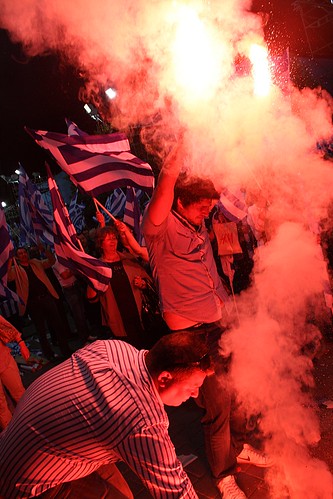
The prospect of a radical left wing, anti-austerity government in Athens has, predictably enough provoked a strong reaction by both local and European elites. Already the local media are running scare stories blaming political instability for falling tourism bookings and saying that ΣΥΡΙΖΑ would use power to grab people's savings. In a similar vein, both Samaras and Venizelos claimed that such a government would get the country kicked out of the Eurozone and the EU and would lead to economic collapse.
On the European level last night the EU said that it was delaying payment of part of the latest bailout tranche, of the 5.2 billion euros promised, only 4.2 billion will be released today, the remaining 1 billion destined to fill holes in the Greek government's day to day running costs will be paid at the some unspecified time in June. Such crude blackmail attempts underline the sense of unease being felt in Brussels and Berlin at the prospect of Greece defying creditors and possibly derailing the entire EU austerity program.
There is an other possibility as the BBC's Paul Mason pointed out that in light of the elected parties being unable to form a government and unelected technocratic caretaker government would be charged with passing the latest cuts and tax hikes scheduled for June and July. Such a move would plunge the country into even more political turmoil as people would see it as a clear defiance of the anti-austerity message the national elections sent. In such a climate the legitimacy of the parties participating in such a government would be shredded, opening up opportunities to other less mainstream parties, including the neo-Nazi Golden Dawn who already have 21 MPs in parliament.

Once again the Greece and the EU are playing a game of high stakes poker, upping the ante and hoping that the other will fold first. However, unlike previous round the mood in Greece has changed dramatically with the worsening economic crisis and threats of dire social consequences of failure to comply no longer hold such sway. With youth unemployment at 50% and the thousands of businesses closing every week, for many the worst has already arrived.
Wednesday, May 09, 2012
Asteris Masouras - Activist, blogger, photographer, citizen journalist- always online

Asteris Masouras - Activist, blogger, photographer, citizen journalist - always online, a photo by Teacher Dude's BBQ on Flickr.
On Global Voices
globalvoicesonline.org/author/asteris-masouras/
Tuesday, May 08, 2012
Squaring the circle - Radical Left's Alexis Tsipras takes turn at forming new Greek government
Αλεξης Τσιπρας/ Alexis Tsipras, a photo by Teacher Dude's BBQ on Flickr.
Well, one of my predictions bit the dust. The possibility that New Democracy would work with Independent Greeks was nixed yesterday when Panos Kammenos refused even to meet with New Democracy leader, Antonis Samaras. Now it's the turn of the leader of the Radical Left coalition party (SYRIZA), Alexis Tsipras to try and form a government. After today's meeting with the president of Greece at 2pm he will have 72 hours to forge a coalition.
At first glance this seems an uphill task given the fact that the Greek Communist party (KKE) has ruled out any possible deal and without their 26 seats getting a 151 seat majority just from the left went from being difficult to being impossible.Even if KKE's leader Aleka Papariga had agreed, the presence of members of PASOK once again in government would have caused enormous problems both within parliament and with the electorate at large who sent a very clear message that they do not want more of the same.

So what's left? One rumour doing the rounds of the Greek language twittersphere is that a quick and dirty coalition of PASOK, Independent Greeks, SYRIZA and Democratic Alliance would form a short term government to repeal the election law that gives leading party an extra 50 seats in parliament and then announce new national elections with a more level playing field.
However, this is just a rumour and I believe the most likely outcome will be Tspiras announcing that a new government cannot be formed in which case the task falls to PASOK leader Evengelos Venizlos who is likely to have even less luck.
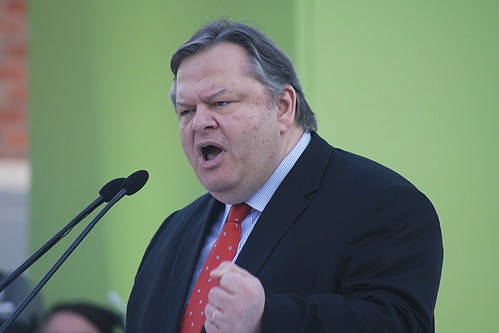
So its seems that new elections will be held once more with the 10th or 17th June being mentioned as the most likely dates. It will be interesting to see if they produce radically different results to the previous ones. Equally interesting will be how this affects the next round of measures required by Greece's creditors in return for the latest bailout installment. If Athens is not in a position to implement the tax hikes and job cuts being demanded will the money be withheld? With government revenues falling all the time what happens to the real economy and the stability of the Eurozone as markets get ready for a possible knock on effect in Spain, Italy and Portugal.
In such a case will the EZ's firewall be enough?

Monday, May 07, 2012
End of an era in Greek politics

With the dust settling on yesterday's election results only one thing is certain in Greece; the previous political era is now officially over. Both the conservative New Democracy and left wing PASOK parties who've dominated the stage for more than a generation received a drubbing at the polls. Even though New Democracy emerged as the largest party, it garnered just 18.89% (at time of writing), just over half its 2009 election share. PASOK, lead by Evengelos Venizelos suffered an even more crushing reversal, and is left with just 41 seats, down 129 from 2009.
Other losers included the far right LAOS party and conservative Democratic Alliance who both failed to reach the 3% threshold for parliamentary representation. Also the plethora of splinter groups/parties set up by expelled PASOK and New Democracy MPs failed to make any headway, with the sole exception of the hard right Independent Greeks lead by Panos Kammenos which won 33 seats.
On the other the Radical Left Coalition (SYRIZA) came second in the polls, just a few percentage points behind New Democracy and gained 51 seats,and would be just 7 behind the conservative if it were not for the electoral rule that awards an extra 50 seats to the party with the most votes. The newly minted Democratic Left also entered parliament for the first time with 19 seats, having attracted much of its support from dissatisfied PASOK voters.
However, the official communist party KKE proved to have a disappointing night, increasing its share of the vote by less than 1%, a reflection that its old style campaign failed to reach out and convince few new voters.
The more worrying development was the rise of the neo-Nazi Golden Dawn party who are set to have 21 seats in parliament. The extremist group which has been linked numerous acts of violence against immigrants and political opponents are not simply a far right formation but rather a party that believes fervently in many of the core tenants of national socialism and Hitlerite ideology. Their ascent to power allows them a place in the political mainstream and assures them airtime on TV and radio from which they can promote a platform of racial hatred and political intolerance.
With the old political order in tatters and a parliament fractured so deeply along deeply held ideological lines forming a new government will be difficult. In the immediate aftermath of the vote many party leaders rushed to deny that they'd form alliances with others. For example KKE leader Aleka Papariga came out against an alliance with SYRIZA while Kammenos ruled out possible partnership with New Democracy. On the other hand ND leader Samaras and PASOK leader Venizelos are reaching out to other political forces in the hope of creating a viable block.
What is clear is that neither the left nor the right are in a position to form a majority government of their own, and that means either new elections immediately or a fractious coalition unlikely to survive the backlash generated by the latest round of job cuts and tax hikes which are likely to the poorest hardest. In that case new elections during the summer seems unavoidable.
The irony is that the unbending demands of the troika (IMF, EU and ECB) has created exactly the situation they were most anxious to avoid, one in which Greece is unable or unwilling to implement the austerity measures that are part of the next "bailout: plan.
Labels:
. Greece,
antonis samaras,
austerity economic crisis,
ecb,
eu debt crisis,
golden dawn,
greek elections 2012,
IMF,
kke,
Laos,
New Democracy,
pasok evangelos venizelos,
SYRIZA,
voting
Sunday, May 06, 2012
Peering into the future - Some predictions for the Greek election results

It's now just after 5pm here in Greece and within a couple of hours the voting will have finished and the first exit polls will be published. unlike many other elections the outcome of today's vote is far from clear. The largest party is most likely to be the conservative New Democracy with about 20-25%, followed by PASOK with 10-15% (the numbers are necessarily vague, a product of wildly differing opinion poll results). This is in sharp contrast to the 2009 national elections in which these two parties got the lion share of the vote with 78% combined, reflecting the stranglehold they have had over power since the late 70's.
However, beyond these two predictions not much else can be said for the possible make up of a future Greek government. The ECB, EU and IMF are all banking on these two parties being able to scrape together a majority in parliament in order to continue with the latest round of austerity measures scheduled for June and July. The leaders of PASOK and New Democracy, while swearing blind to the contrary are both hoping their electoral base will have held firm enough to give them a place in a coalition government and so avoid bloody internal conflict involving both backbenchers and rank and file party members. Both Venizelos and Samaras are by no means loved universally loved by their own supporters and a failure to get into power would open up still raw wounds .
On the other hand many other smaller parties are picking up support from disgruntled ND/PASOK voters and that is really the joker in the pack, threatening to overturn the political status quo that was created in the aftermath of the fall of brutal Regime of the Colonels in 1974. Some parties such as the rightist Independent Greeks are new creations whilst others such as the Neo-Nazi Golden Dawn have a longer, if more savage lineage, either way they are attracting votes at a rate that would have been inconceivable even a couple of years ago.
On the left of the spectrum the old school communist party KKE has gained ground as have other leftist parties such as The Radical Left (SYRIZA) and the newly minted Democratic Left with some estimates saying their combined share of the vote may pass 40%.The one thing that unites such disparate groups is their opposition to the austerity package imposed by Greece's creditors, however what else could possibly bring them together remains a mystery.
I'm going to put my money where my mouth is and say that I believe that the polls will produce a three party coalition government including PASOK, New Democracy and possibly Independent Greeks party. I base this prediction on nothing more scientific than a hunch and past experience of Greek politics (though give the sweeping changes going through the system that may not be the best guide). the thing to remember when analysing politics here is that ideological labels often count for little when power is concerned and so a coalition will be based on mutually aligned interests rather than political overlap.
If such an alliance does take power I believe that it is destined to fall apart as the political cost of yet more job cuts and tax hikes takes its toll. So quite possibly Greece will be going to the polls once more before September.
Saturday, May 05, 2012
Have you got what it takes to be part of the new Greek/EU middle class?

Tired of being part of the herd? Want to stand out in a crowd? Take our new Austerity Superstar Challenge and see if you have the Right Stuff to make it in today's European Union. Tick if the following applies to you.
1-It's the end of the month and you still have money in your wallet.
2-You paid all your bills on time.
3-Turning on the heating doesn't bring you out in a cold sweat.
4-When you go to the supermarket you use a shopping trolley and not a basket.
5-You have paid holidays.
6-You go away on holiday.
7-You still use the phrase, "fill it up" at petrol stations.
8-Many of your friends are employed, some are even getting paid.
9-You shopped for something that cannot be eaten.
10-You haven't locked away all your credit cards.
Alexis Tsipras at campaign rally in Thessaloniki, Greece
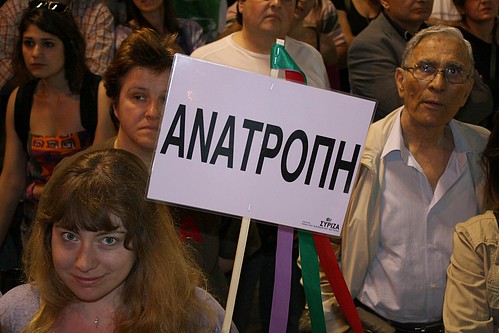
About 2000- 3000 people attended the election rally by The Radical Left coalition of smaller parties in Aristotelous Square in the centre of Greece's second largest city, Thessaloniki.
As support for the two largest parties, PASOK and New Democracy wanes parties on the left and right of the political spectrum are picking up votes from Greeks deeply angered by three years of austerity and economic recession.
Friday, May 04, 2012
Government versus people - Greek elections 2012
In the picture you can see so much of how the current Greek political scene has changed since the last national elections in 2009. Then, a rally by a major political figure would have taken place in Thessaloniki's central Aristotelous Square with the space dutifully filled with party supporters bussed in from all over northern Greece.
The security needed would have been more low key and the adoring public would have been allowed to approach and even talk to their leaders. This is no longer possible for most of the country's most political elite and instead of adoration party stalwarts like PASOK's Evangelos Venizelos are reduced to ever more convoluted ways of appearing popular whilst hiding behind layer upon layer of security.
Instead of wide open squares the dwindling number of party faithful are corralled into narrow strips in order to bulk out numbers for the TV cameras which work hard to create a sense of mass and enthusiasm.
In this particular case PASOK packed out the front rows with a hundred or so members of its youth wing, disguising the fact that behind them was just 1000 or so supporters, whose average age seemed to be in the 50's.
For both PASOK and New Democracy participation in a pro-austerity coalition government has whittled away at their electoral base and for the first time in a generation they are faced with the real prospect of not being able to form a government, either on their own or together.
Instead of adoration and cheers party officials are often meet with jeers and something yoghurt thrown by disgruntled voters, disgusted with austerity policies.Hence the heightened security measures that underline the gulf that has grown up in the last few years between a discredited political elite and an electorate at the end of its tether.
For many 6th May national elections will mark the end of an era begun in the 70's in which PASOK and New Democracy dominated national politics and promises to usher in a newer, more volatile chapter in public life in Greece.
The security needed would have been more low key and the adoring public would have been allowed to approach and even talk to their leaders. This is no longer possible for most of the country's most political elite and instead of adoration party stalwarts like PASOK's Evangelos Venizelos are reduced to ever more convoluted ways of appearing popular whilst hiding behind layer upon layer of security.
Instead of wide open squares the dwindling number of party faithful are corralled into narrow strips in order to bulk out numbers for the TV cameras which work hard to create a sense of mass and enthusiasm.
In this particular case PASOK packed out the front rows with a hundred or so members of its youth wing, disguising the fact that behind them was just 1000 or so supporters, whose average age seemed to be in the 50's.
For both PASOK and New Democracy participation in a pro-austerity coalition government has whittled away at their electoral base and for the first time in a generation they are faced with the real prospect of not being able to form a government, either on their own or together.
Instead of adoration and cheers party officials are often meet with jeers and something yoghurt thrown by disgruntled voters, disgusted with austerity policies.Hence the heightened security measures that underline the gulf that has grown up in the last few years between a discredited political elite and an electorate at the end of its tether.
For many 6th May national elections will mark the end of an era begun in the 70's in which PASOK and New Democracy dominated national politics and promises to usher in a newer, more volatile chapter in public life in Greece.
Subscribe to:
Comments (Atom)
